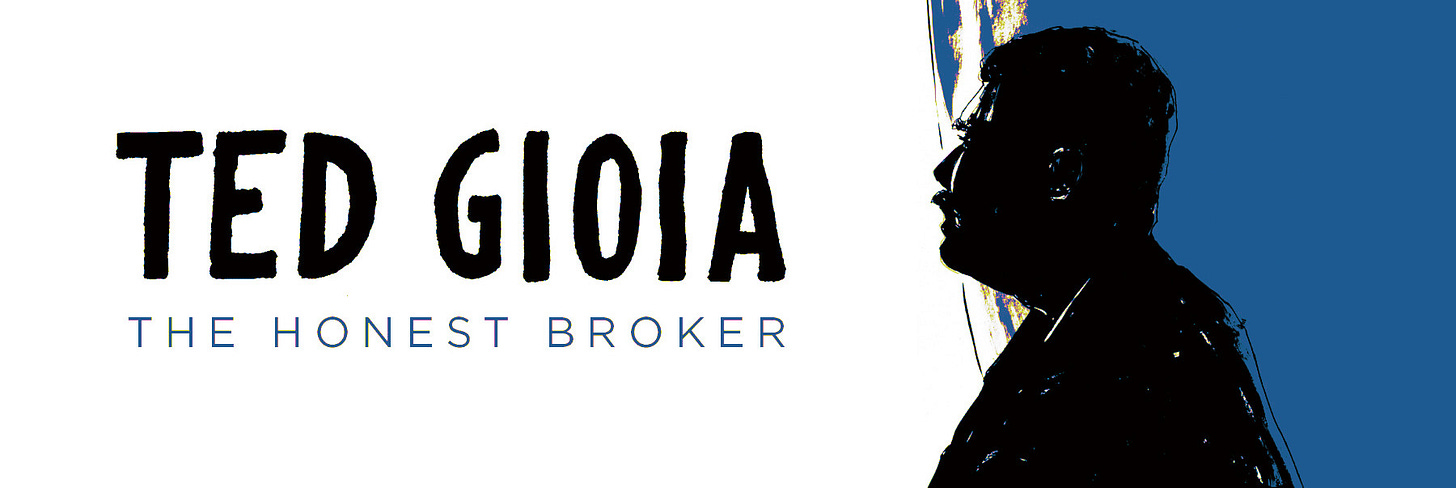Why Musicians Can't Retire
Sometimes it's better just to walk away—but very few superstars pull it off
At age 90, film composer John Williams announced his retirement. But six months later, he changed his mind. “You can’t retire from music,” he said. “It’s like breathing.”
But music fans are familiar with this.
The Honest Broker is a reader-supported guide to music, books, media & culture. Both free and paid subscriptions are available. If you want to support my work, the best way is by taking out a paid subscription.
A few musicians really do retire, and stay that way. When Bobbie Gentry said goodbye in April 1982, she not only stopped performing but seemed to drop off the face of the earth. (And she’s still alive, out there somewhere—most likely Memphis—enjoying her long retirement 41 years later.) Artie Shaw stopped playing clarinet in concert at age 43, and though he later sometimes conducted, he didn’t perform again during the remaining half century of his life.
But those are rare exceptions. Most music stars need the applause of fans, and can never stay off the stage for long. One of my friends died in the middle of a gig. I grieved, but in a way I thought that might be exactly how he would have wanted to go.
So I’m not surprised that Nicki Minaj’s retirment didn’t even last six months—on September 5, 2019 she told fans she was quitting to have a family, but announced a new album on September 26. Justin Bieber’s retirement was even shorter—just two weeks long. Azealia Banks may have set the record with a 24-hour retirement.
Fans grow skeptical, but so do the musicians themselves. Phil Collins actually mocked his own retirement concerts, billing them as “The First Final Farewell Tour.”

Frank Sinatra announced his retirement in 1971. And then he went on to play another one thousand concerts over the next quarter of a century. In September 2000, Barbra Streisand announced that she was giving her final concerts, but she continued to record new tracks and in 2006 launched another tour.
Or let’s consider the extreme case of Elton John, who may set a record for farewell concerts:
In 1977, he told an audience at Wembley Stadium: "I've made a decision tonight...this is going to be the last show."
During the 1984 Breaking Hearts tour he told audiences repeatedly that this would be his last tour.
In 2010, John told GQ: “I'm at that stage where I don't think I can write pop music any more. I can't sit down and do a proper rock song. It was OK when I was 25 or 26, but not any more."
In 2012, while discussing the birth of his son, John said that he was happy performing for the time being, but “when Zachary goes to school, that's another different thing. I want to take him to school and I want to pick him up. I don't want to miss that part of his childhood."
In 2014, John told a French audience: "No more shows, no more music, no more songs.”
In 2018 Elton John embarked on his “Farewell Yellow Brick Road” tour, which kept going on for years and several hundred concerts.
Currently his final show is supposed to take place at Glastonbury in June 2023. We shall see.
It’s almost cruel to cite these examples. That’s because we want our artists to keep on the road. But sometimes we ought to let go.
I’m reminded of the quip of Roman epigrammist Martial who said: “Fortune gives too much to many, but enough to none.”
Frank Sinatra’s drummer has shared stories of his final performances, and they do a disservice to the singer’s legacy. I don’t think the people who kept B.B. King on the road in his last days were doing him—or any fans—a favor.
And I know others will disagree with this, but when Lady Gaga decided to collaborate with 95-year-old Tony Bennett, six months after he was diagnosed with Alzheimer’s, I wasn’t among those cheering and applauding. According to his family, Bennett was “not always sure where he is or what is happening around him.” Putting him on the stage was exploitative, in my opinion.
But, hey, it got a lot of press.
Years ago, I felt cheated when some superstar musicians retired—especially if I hadn’t had a chance to see them in concert. But Stan Getz once took me to task when I told him my disappointment that Benny Goodman, who was still alive at the time, rarely performed on the West Coast in his final years. “He deserves to enjoy a period of retirement,” Stan admonished me. “He has been playing for audiences since the 1920s.”
And, of course, Stan was right.
I know that Getz often thought about retirement. When he came to Stanford, he had some hopes that it might be a final career shift that would remove the pressures of going on the road. And if the University had been a little more supportive—of jazz in general and Getz in particular—it might have happened that way. As it turned out, he got more support in his final days from Herb Alpert than from Stanford University.
In the case of Benny Goodman, I found it fitting that he was playing music on the day he died—but for himself, not an audience. I’ve heard different accounts of the music. Some say he was playing Mozart, while others mention a Brahms’s sonata (Opus 120). When his housekeeper found him, he still had his clarinet in his hand.
But Goodman, unlike his clarinet rival Artie Shaw, never really did enjoy retirement. The night before his death he was at a club scouting a singer he might add to his band for a forthcoming tour.
I’ve written elsewhere how the unexpected onset of arthritis—in my early 30s!—put a halt to my jazz piano career. I was devastated. Nothing was more important to my self identity than my vocation as a musician. To some extent, my sense of self worth came from the piano.
Eventually the symptoms subsided, and I was even pain-free again (and still am today), but I feared the affliction would return if I spent too many hours at the keyboard. So I resumed playing in very small doses, turning down gigs and avoiding intense practice sessions. I focused instead on making music just for my own enjoyment.
In a way, this was a blessing. I developed other capacities—for example, writing—and when I did make music, it was for the sheer delight of it. Now, so many years later, I don’t brood about this enforced shift in my life, and suspect that it may have given me a healthier attitude to music.
All of us who make music should cultivate this intrinsic delight in the process. The applause of an audience (and all the other perks) are great, but is that really why we embarked on this vocation in the first place?
But applause can become addicting. And I’ve noticed something unsettling in my many years around musicians. The more they get the acclaim, the more they start needing it. You might think that after all the big paychecks and standing ovations, they would eventually have reached some sense of self-satisfaction that would allow for an easy retirement.
But that’s not true. In fact, the opposite is the more typical case. The more the artists are rewarded, the more they still want. I’m reminded of the quip of Roman epigrammist Martial who said: “Fortune gives too much to many, but enough to none.”
And sometimes it’s better to walk away when you’re still riding high. I greatly admire performers such as Audrey Hepburn or Shirley Temple, who happily launched second careers doing charitable works and good deeds. They used their fame for something different, something perhaps better.
My view is that Madonna would have a much more powerful and positive legacy if she did something like that. She is shrewd and gets results, and could have an amazing impact on the world off the stage.
But could she ever walk away? I don’t think so.
Of course, every performer’s story is different. Some musicians are operating at an amazing level until the very end. But others probably should have declined to do that final gig. (Even this incomplete list of musicians who died while performing is surprisingly long.)
I saw Bill Evans perform a week before his death, and that evening he was in total command of the music (although perhaps not on other nights) despite his poor physical condition. Yet it’s quite likely that he would have lived much longer if he had stopped touring, and sought medical treatment. I also saw Chet Baker play in his final days, and though many told me he was burnt out from his addict’s life, he absolutely delivered the goods onstage.
On the other hand, I remember the time I was supposed to interview a well-known jazz singer after the gig, but he was so exhausted that I decided to give it a pass—and he was dead before the year was out (although not from concertizing).
Many entertainers keep performing because of external pressures. And it’s not only fans who keep them on the road. Sometimes greedy managers or family members prod them into one more concert, one more tour, one more album. Sometimes this is nothing less than elder abuse—as Mickey Rooney outlined in his riveting Senate testimony at age 90.
As fans, we can’t really see what’s happening behind-the-scenes. But we shouldn’t just instinctively cheer and applaud when a 90-year-old performer announces a concert tour. Even better, we should try to find ways to support and acknowledge our elders that don’t require grueling tours.
For example:
Maybe some of the non-profit institutions that give money to up-and-coming musicians should also consider funding the down-and-out artists in their final days.
Maybe a few music education programs around the country can find a place for our senior citizens—who would make great mentors for the next generation—so that they can earn a living while staying close to home.
Maybe we can set up subsidized housing for “elder Master Musicians in Residence”—much like the Ellis Marsalis Musicians’ Village in the Ninth Ward of New Orleans.
Maybe we can support the handful of charities that are already doing good deeds for older musicians, such as the Jazz Foundation of America.
In a world that did these things, musicians could keep performing as long as they wanted, but they would also have an easier time walking away from the stage. If you want to create a healthy musical culture that might be even more productive than buying a ticket for those never-ending ‘final’ concert tours.




It took me a while to realize that a career can be likened to chapters in a book. The final chapters in my long career as a scientist are much different than the beginning and middle chapters. Most time is now spent teaching and mentoring. The best part of this is that these chapters are just as fulfilling if not more than earlier chapters.
Thanks Ted for your thoughtful contribution.
Great timing. I'm no superstar--I barely qualify for the bottom rung of "unknown"--but just yesterday I drafted an email to my 500-ish music newsletter subscribers to say something about how I am back to focusing on prose-writing now and I haven't gigged since last July or written a new tune in ages or even practiced piano much in two seasons, and I probably won't be out there again until...
Then I stopped myself, thinking, "Wait, how many times have I sworn I'm done with music only to show up again a few months or years later? Maybe I should just let the moment pass in silence until I have another show date to announce."
Was still vacillating until I read your piece and decided definitely not to bother saying a word yet. 🤣